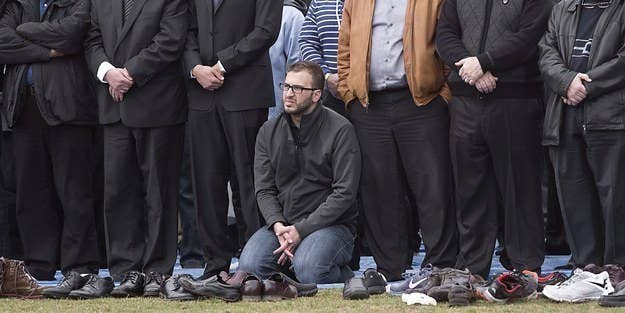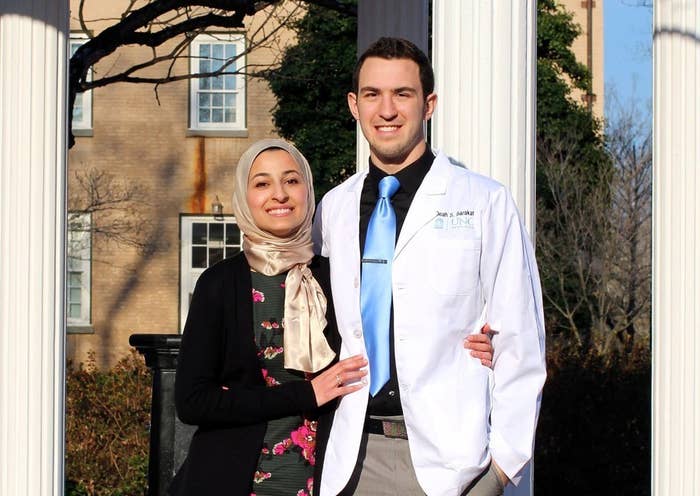
The brother of a Syrian-American who was fatally shot in Chapel Hill, N.C. earlier this year inside his apartment — a case seemingly tinged with religious bias — spoke out Monday against the growing coalition of United States governors saying they will refuse Syrian refugees after this weekend’s terror attacks in Paris.
Farris Barakat, who along with his slain brother, Deah Barakat, is Syrian-American, told BuzzFeed News the governors should not rush to judgment and needed to approach the issue more creatively — not act out against an entire population fleeing their war-ravaged country.
North Carolina’s Governor, Pat McCrory, was the thirteenth governor to announce that his state would reject any refugees. McCrory called on the Obama administration to “cease” resettlement immediately “until we are thoroughly satisfied” that concerns about safety that he expressed are resolved.
Speaking at a news conference, McCrory added that some of the governors will be meeting later this week: “I’m sure all of us will be speaking, as a group, in the very near future.”
Their statements come after it was revealed that one of the suicide bombers in Paris had a passport from Syria, and likely traveled from there to Greece to France. It is still unclear if the passport was real or actually belonged to the bomber.
“I’d hope that Pat McCrory or any of the governors will be more creative in their demands," he said, and not "shut down asking refugees to settle here.”
“I think it’s really important that they understand that the reason these people are seeking refuge in this country is because ISIS destroyed theirs. We’re fighting the same enemy,” he said.
Barakat added that a robust vetting process “absolutely makes sense,” but “I’m not sure if [these governors] are aware of the process that refugees go through.”
It’s true that the U.S. has one of the most strict processes for vetting refugees in the world. Since the start of the Syrian civil war, fewer than 2,000 Syrian refugees have been admitted. And although the Obama administration said the U.S. will accept 10,000 refugees in 2016, the complex process takes an average of 18 to 24 months.

On February 10, 2015, Barakat’s brother, 23-year-old Deah Barakat; his wife, Yusor Abu-Salha; and her younger sister, Razan Mohammad Abu-Salha were shot and killed at an apartment complex in Chapel Hill. The shooter, a disgruntled neighbor, Craig Hicks, was charged with three-counts of first degree murder and is facing the possibility of the death penalty if convicted.
Following their family members' tragic deaths, the Barakat and Abu-Salha family called for Hicks to be charged with a hate crime, claiming that he deliberately targeted the three young Muslim-Americans because of their faith. A federal hate crime investigation is still pending.
Barakat said it was important that his family get a message to fellow Muslims not to meet violence with violence — so that ISIS does not use his family’s tragedy for their cause.
“We were afraid that ISIS could use" his brother's death "to say that this was American terrorists killing Muslims,” he said.
Barakat recently traveled to the Turkish border of Syria to fulfill the wish of his brother — a dental student at UNC at the time of his death — to bring dental assistance to refugees in the region. Using money raised online following the Chapel Hill shootings, Barakat and other family members brought $50,000 in aid to the border to set up a clinic in his brother’s name.
The son of Syrian immigrants who traveled to the U.S. in the 1980s, Barakat said his mother is currently in Germany helping her two sisters, who are refugees, settle in Europe. Barakat said his relatives have already endured “crazy” experiences, traveling to the Turkish border three times before they could gain passage through Greece to get to Europe.
Asked if he was worried about a potential backlash against Muslim at home in Raleigh, North Carolina, Barakat said that he had already seen instances of fear in his community since the attacks.
“My friend posted on Facebook today that her mom went out jogging and is wearing a hat instead of a headscarf because she’s afraid,” he said.
